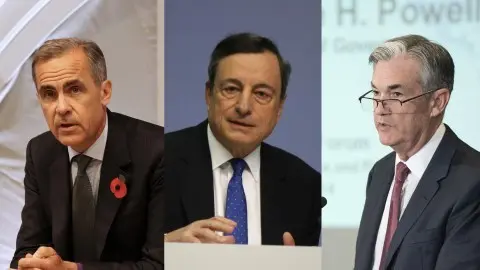ECB: Not sexy but highly effective
The ECB remains determined to continue its chosen path to bring net QE to an end in December
No change today
No changes from the ECB and President Mario Draghi. As expected the European Central Bank sticks to its autopilot to bring net QE purchases to an end in December. It didn't deviate from its earlier language and looks highly determined to continue with its strategy, chosen in June.
What Draghi said
Some noteworthy comments by ECB president Mario Draghi during the press conference:
- risks to the growth outlook are balanced. With the latest stock market correction and dropping confidence indicators, some market participants had been speculating on some changes in the ECB’s assessment. Wrongly so. Draghi gave a good overview of the ECB’s take on the Eurozone economy. According to Draghi, the ECB acknowledged a somewhat weaker momentum in the Eurozone but still positive output gaps, positive domestic demand and pro-cyclical fiscal policies plus several country-specific temporary factors. Draghi, in our view, rightly so reiterated that the Eurozone was currently experiencing a weaker momentum but not a downturn.
- the expected pick-up in core inflation. Draghi stressed increasing negotiated wages in several countries, an expanding but tightening labour market and high capacity utilization rates were at the basis of the ECB’s expectation of a gradual increase in underlying inflation.
- Italy is a fiscal issue. Obviously, Draghi was asked about Italy. Also, obviously, Draghi did not come up with any surprising comments. According to him, Italy was mainly a fiscal issue, the European Commission not the ECB was the Guardian of the Treaty and higher interest rates reduce the room to expand the budget.
The year ahead
All of these comments demonstrate that the ECB remains highly determined to bring net asset purchases to an end at the December meeting. It would require a severe downturn of the economy, not only weaker momentum, in the coming six weeks for the ECB to alter its course.
Looking beyond December, however, weaker growth and the lack of higher underlying inflation could in our view still lead to currently unexpected changes in the ECB’s monetary policy. Just think of the length of QE reinvestments, new TLTROs (already mentioned by two ECB members today) and forward guidance on interest rates. With every new disappointing data releases, the probability increases that the ECB will fine-tune the non-QE tools. At the same time, chances that Draghi could deliver at least one rate hike before leaving office decrease. But this will be 2019’s story.
For this year, the autopilot should remain the main story. The ECB’s autopilot to bring net QE purchases to an end. Not very exciting for markets and ECB watchers but highly effective.
This publication has been prepared by ING solely for information purposes irrespective of a particular user's means, financial situation or investment objectives. The information does not constitute investment recommendation, and nor is it investment, legal or tax advice or an offer or solicitation to purchase or sell any financial instrument. Read more
Download
Download article
25 October 2018
In case you missed it: A flurry of central bank meetings This bundle contains 11 Articles